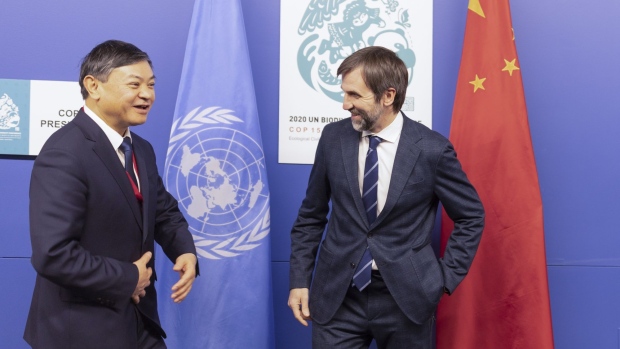Dec 17, 2022
COP15 Isn’t Moving Fast Enough for Canada’s Activist Minister
, Bloomberg News

(Bloomberg) -- On a day full of meetings and on-the-go interviews with journalists, there was one man who made Canadian environment minister Steven Guilbeault forget his packed schedule. At the UN biodiversity summit in Montreal, Guilbeault stopped to bear hug 86-year-old environmental activist David Suzuki, host of popular Canadian TV program The Nature of Things.
While Guilbeault might today represent a country with an enormous oil and gas sector and spotty climate record, he still embraces, literally and figuratively, environmental activists.
Years before joining the government in 2019, Guilbeault wasn’t afraid to scale the outside of a skyscraper if it meant drawing attention to environmental causes. He built up his career through campaigning network Greenpeace and Montreal-based Equiterre. In an interview on Wednesday, Guilbeault said that Canada’s Prime Minister Justin Trudeau wanted him to continue activism in his ministerial role, which he started a little over a year ago. “He appointed me to this role to be an activist,” he said. Guilbeault believes having an activist representing the host country at COP15 will help move the needle on negotiations.
The 52-year-old politician is one of the most experienced in any room with multilateral summits. Guilbeault, who is trying to seal a deal with more than 190 other countries to protect and restore the planet’s natural systems, has taken part in UN meetings on climate and biodiversity since the mid-1990s. It’s unlikely that many of his peers or the 18,000 people gathered in the Palais des Congres de Montreal can say the same.
But the odds aren’t aren’t looking good to have an agreement by the scheduled end of the conference Monday. Friction points have included a consensus over protecting 30% of the world’s land and sea by 2030, $200 billion a year in financing biodiversity by the end of the decade, and controversy over genetic resource benefit sharing — which involves using genes in living organisms to create new products.
Earlier this week, disagreements over funding prompted developing countries to walk out from negotiations, which are still at risk of being derailed by even smaller issues. One word, such as committing to a new “fund” instead of “mechanism” or “initiative,” can be debated for hours, even days. As of Friday the European Union was still opposing the creation of a “new” biodiversity fund – saying there are already facilities in place to channel money for related purposes.
“It’s normal for this to be complicated,” Guilbeault said, insisting COP15 will land on a positive framework.
China is technically presiding over the conference, but the location was changed to Montreal because of Covid lockdowns. Canada has had its share of dissents with China in recent years, culminating in a public and tense discussion at last month’s G20 summit between Trudeau and President Xi Jinping. But the relationship between Guilbeault and his Chinese counterpart, Huang Runqiu, seems quite different in Montreal, even collaborative, as they could be seen smiling and laughing together before a bilateral meeting Wednesday night.
“We both decided that there are things we don’t agree on but, on environmental issues, we need to agree and we might be able to work together,” Guilbeault said. “China has very good contacts with countries in Asia and Africa. Canada is part of the High Ambition Coalition for Nature and People, and we are part of the donor countries. So we are both trying to use our contact networks.”
Looking at Guilbeault in his fashionable blue suit — socks matching his tie — it’s hard to believe he’s the same man who donned an orange jumpsuit tagged with Greenpeace’s name and climbed Toronto’s CN Tower in 2001. He unfurled a banner denouncing “Canada and Bush Climate Killers” for not ratifying the Kyoto protocol, and later came back down in handcuffs.
Guilbeault can still challenge authority in his job. Debates with Trudeau happen, he said, but insisted his boss is perfectly aligned with him over the necessity to act.
Nevertheless, the activist-minister said he can’t win all battles, without mentioning the ones he lost. One of Guilbeault’s most controversial decisions was giving the green light to the Bay du Nord deep-sea oil drilling project in Newfoundland and Labrador in April. His argument about the project having the strongest environmental conditions ever didn’t resonate so well with climate groups.
Guilbeault said one of his big successes has been Canada’s C$9 billion 2030 emissions reduction plan, but he’s frustrated that greenhouse gas emissions haven’t come down enough yet. Canada, the fourth-largest oil producer globally, ranks near the bottom of a list of countries evaluated for their effort to fight climate change, according to the Climate Change Performance Index. Guilbeault said his next goal is to cap emissions in the oil and gas sector.
Environmental campaigners are divided on Guilbeault’s progress so far. “I think it is a real opportunity to have someone who comes from this strong environmental background, where there’s a level of openness to get things done,” said Reykia Fick, nature and food campaigner at Greenpeace Canada, on Guilbeault’s past year in the job. “It’s an opportunity, and not a done deal.” She mentioned her lobby’s disappointment over new tax credit subsidies to oil and gas companies for carbon capture, utilization and storage. But she said Canada’s pledge to stop financing international fossil fuel projects was a positive development.
Guilbeault said there are “trade-offs” to be made in government. It’s “not always easy between economic development and jobs, and environmental protection,” he said, adding his activist spirit is pushing him to go harder for progress at COP15. “I’m the first one to say we should go faster.”
©2022 Bloomberg L.P.


